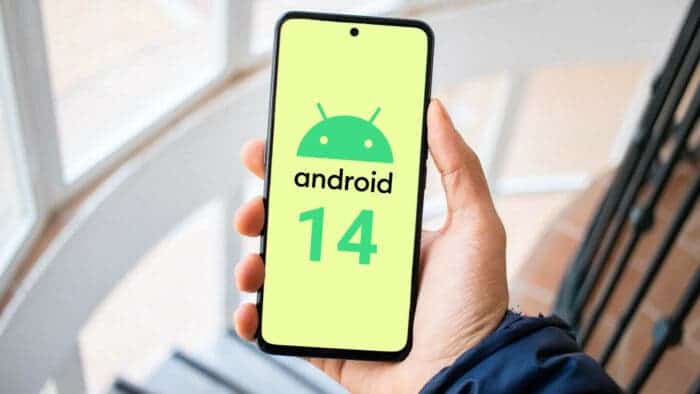

Android 14: new features, release date and compatible devices
source link: https://www.gizchina.com/2023/01/05/android-14-new-features-release-date-and-compatible-devices/
Go to the source link to view the article. You can view the picture content, updated content and better typesetting reading experience. If the link is broken, please click the button below to view the snapshot at that time.

Android 14: new features, release date and compatible devices
The upcoming Android 14 version of Google’s mobile operating system is already under development. The successor to Android 13 is currently undergoing internal testing within the company and promises to launch without indicating significant changes.
Mobile phones undergo yearly updates as part of the routine renewals, and they typically hit the market concurrently with operating system upgrades. And one example of this strategy is Android, which debuts each year along with a dessert named after it. The launch of Android 14 in 2023 means it’s time to figure out all the new features, smartphones that will upgrade, and when they’ll do it. So, let’s start now.
What devices will receive the Android 14 update first?
Which Android-compatible smartphones, tablets, and other devices will update to version 14 is still unknown. We are aware of a few smartphones, the Pixels, that will get the update on a schedule. These users in particular will be the lucky ones:
- Google Pixel 4a.
- Google Pixel 5.
- Google Pixel 5a.
- Google Pixel 6.
- Google Pixel 6 Pro.
- Google Pixel 6a.
- Google Pixel 7.
- Google Pixel 7 Pro.
When will Android 14 be available?

There is presently neither a beta nor an open version of this operating system for developers (Dev Preview) because it is still in development. Even so, we can draw up an update schedule if we analyze Google’s usual strategy with its system.
The Dev Preview, an experimental upgrade for the Google Pixel (likely starting with the Pixel 5 and newer), will be the first to see when it launches in February 2023.
We will have to wait until Google I/O, the company’s biggest event, for the first open beta of Android 14. According to prior years, we will have to wait until May 2023, but the exact date is unknown.
The beta would be released in May, the Dev Preview in February. And the final version at the end of the summer, most likely in September.
The final and stable Android 14 will very definitely be launched towards the end of August or the start of September 2023, and it already has a dessert name attached to it (although unofficially, Google will officially name the system version as Android 14). Now that Android 13 is Tiramisu, it’s time for a dessert with “u”. The upside-down cake, also known as cake baked upside down, is a pastry technique used to make desserts, and Google has already confirmed that Android 14 will use this nomination.
How to update to Android 14

Gizchina News of the week
Each manufacturer will publish a timeline for updating existing devices to Android 14 and a method for doing so. In general, an update notification ought to show up as soon as the mobile device has it. Once Android 14 is in use, it is also practical to perform a manual search via the system settings.
The Google Pixel smartphones will be the first to receive the upgrade, and the Dev Preview is currently in progress (and later with the betas). You must use this link to join them. Additionally, updated system files will be accessible on the website for Android developers.
New features in Android 14

For the moment, we have just a few leaks regarding the features of the upcoming operating system. In comparison to Android 13, this system will not significantly change, at least not in terms of appearance, significant innovations, or configurations. There is less and less room to implement significant modifications into a highly developed system that operates flawlessly.
Android 14 will surely return one of the navigation gestures that was missing, that of previewing the previous screen when going back from the edge of the screen. Present in the Android 13 developer options, the gesture would be included as default in Android 14.
Android 14 will require manufacturers to support the open source and cost-free AV1 codec. With a more refined and very effective compression, this codec promises to enhance video streaming.
The satellite connection, introduced by Apple in the iPhone 14 and iPhone 14 Pro smartphones, will be available with Android 14 so that manufacturers can integrate it into their devices. It allows for communications without mobile or WiFi network coverage.
Future Pixel phones will probably have satellite capabilities added by Google. But it’s unclear how many other manufacturers will do the same. Additionally, we are unsure of whether satellite technology will be free or require a membership. Only two years of free Emergency SOS have been offered by Apple with the activation of new iPhone 14/14 Pro models.
Health Connect may not be well-known to you, but it works similarly to Apple’s HealthKit by acting as a middleman between different health and fitness apps that want to share and access data. In addition to Google’s own Fitbit and Google Fit, third-party platforms like Peloton, Tonal, Samsung Health, and MyFitnessPal already support it.
Health Connect is presently a free beta software that can be downloaded from the Google Play Store. Integration into Android is Google’s long-term objective. Thus the real question is whether it will happen with Android 14 or at a later date.
Beyond what the initial leaks indicated, Android 14 should focus on privacy and security. To provide users more control over device permissions, various hardware components, and software. Material You will evolve in options without straying from what has already been seen in design. And the adaptive changes in hue are sure to reach all corners of the devices.
Recommend
About Joyk
Aggregate valuable and interesting links.
Joyk means Joy of geeK
